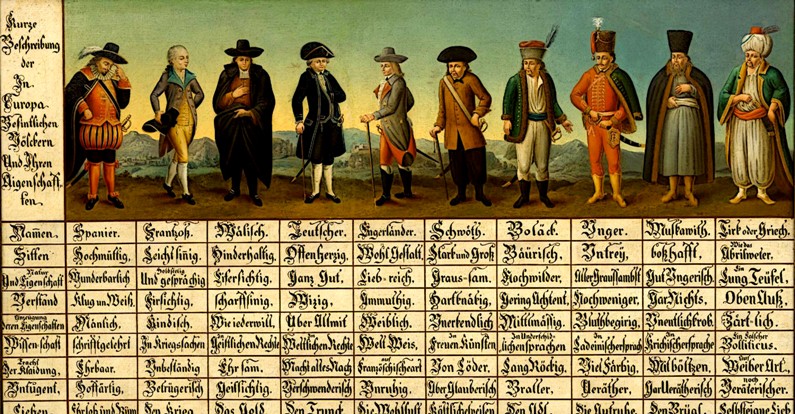The Hungarians never expected thanks for protecting Europe for centuries as a bastion of Christianity at the cost of their lives
The tableau depicting European peoples, which was nailed in the cities of the German Empire in the 18th century, was called Völkertafel. In roadside inns, pubs, post stations and other public places, they were able to find out about strangers on the basis of this, the post station about its passengers, the farmer's guest, and the traveler on the road about his fellow traveler, his nation and nature.
It was important to know what kind of behavior was expected from the other person based on his appearance, whether he paid the guild, whether he read the Bible peacefully, or whether he would draw a sword if he didn't like something. The Völkertafel was originally an oil painting, probably commissioned by an Austrian or Bavarian painter around 1720. He portrayed the most important peoples of Europe and described their characteristics based on the ethnostereotypical clichés of the time. I mean, based on German clichés.
The Germans spontaneously applied their cliché to themselves.
They portrayed themselves as open-hearted, witty and selfless, steadfast in faith, learned in law, invincible in battle, always loyal subjects to the emperor, just what they wanted to be. Unfortunately, they could not do anything about the natural endowments of their country, it was what it was, but everyone was satisfied with what they got. Even with gout, although it was the disease that tormented them the most.
We Hungarians are also there in the tableau depicting European peoples, in the TOP 10 in the company of Spaniards, French, Italians, Germans, English, Swiss, Poles, Muscovites and Turkish-Greeks. The order could be arbitrary, but no, this order expresses a value system. By the 18th century, Europe had long been divided into central (rich) and peripheral (underdeveloped) countries, the value system was no longer based on virtue and ethos, but on wealth and power. Even then, the Western countries, aware of their power, were driven by superiority, contempt and arrogance towards the Eastern ones.
The English, French and German gentlemen depicted in the picture are dressed according to the fashion of the time, the others were painted by the master in clothes reflecting their specific, characteristic lifestyle.
I can say without bias that Hungarian clothing is the most gorgeous. The Hungarian wears leather boots, a red dolman with golden valance binding, a green jacket with fur draped over his shoulder, and a perky egret feather on his hat. With a straight waist, resting his hand on his saber, he looks at the world with a fearless gaze.
Despite this, we are only third from the back in the ranking, because the country's political weight and the centuries-old clichés against Hungarians predestined us there. At that time, the Kingdom of Hungary - thanks to the Habsburgs - was already mutilated, after the expulsion of the Turks, Transylvania was not annexed back to the country, and the Southern region also came directly under the control of Vienna.
Neither the Labans nor the real Germans liked us. The master painter depicts according to the wishes of the customer, only Musk and Turks are worse in the world for us. (Clear as today.)
In the tableau of the peoples, Hungarians appear as bloodthirsty, cruel, disloyal and treacherous. His belligerence encourages him to rebel, he rebels against his king, his lord, his ever-present superior, and he is always dissatisfied. No wonder he typically ends his life with a sword. The Hungarian man is like a wandering wolf, restless, evil and dangerous. The Hungarian knows no measure in anything, that's why he is bloodthirsty and often avoids gout.
His only science is Latin, but everyone in this country knows Latin, even the last peasant. They don't even understand, they don't want to understand, how could God give the richest region in Europe to these perpetually rebellious Hungarians? Envy can be clearly read from the Völkertafel, because the Hungarians undeniably have an abundance of everything: good harvests, gold, forests, waters. Their gorgeous clothing also shows their wealth. This is why I envy us, and perhaps also because of our desire for freedom that ends in perpetual rebellion. Envy breeds hatred, and hatred is a bad counselor, capable of all wickedness.
Today's perception of Hungarians - thanks to the negative clichés spread in the German-speaking area - has traditions going back centuries. While the image of Hungarians in medieval Italy was good, they were considered to be brave, ready for battle, cheerful and educated, while Ottó Freisingi, the best-known German chronicler of the Middle Ages, wrote about ugly people with short, deep-set eyes.
Although it is also possible that he only passed on the image of our adventurous ancestors to posterity. In any case, starting from the 17th century, German political literature depicted the Hungarian character and education as increasingly dark, and they were especially malicious towards Hungary.
"There are uniquely few educated people in Hungary compared to Europe, and the reason for this is that the character of the people is not suitable for higher intellectual activity. Hungarians are unreliable and cunning, they don't like to work, they only like to graze and serve as soldiers. As a result of the wars, everything has gone wild here. An educated person's homeland is Hungarian, but his education is German, because those who want to study go abroad, primarily to German universities. If there is anything good in this country, it is only thanks to the Germans."
This is how Oldenburger Andreas, for example, manipulated his readers against the Hungarians in 1666. The author also accused the Hungarians of being dangerously German-haters. After such a summary, I don't think it would be surprising.
Why did a negative image of us develop?
After all, the heroic struggle against the Turks initially evoked sympathy in Europe. "Despite the territorial losses, the Hungarians stand unwaveringly against the most formidable enemy, the Turks, the edge of their minds is equal to that of their weapons. They have excellent mental abilities, they teach languages and the true faith in their schools." The rector of Wittenberg himself wrote this in 1598, but he learned about the country first-hand, from the Hungarian students studying in Wittenberg, and not based on hearsay. The rector also added that Hungary is one of the richest European countries.
And I think this is the key phrase in judging Hungarians. There is a medieval topos that has been preserved in our collective consciousness to this day. "Extra Hungariam non est vita", meaning "there is no better life than in Hungary". This country itself is paradise on earth, a Canaan flowing with milk and honey, abundant in wildlife, gold and fertile land. The Hungarians experienced the perpetual wars, the disintegration of the country, and the lost wealth as God's punishment. The formerly rich and powerful Kingdom of Hungary, which alone protected Europe from Ottoman expansion, had to face the fact that it was left alone in its fight. (As so many times throughout history since then.)
This realization triggered a series of uprisings, conspiracies and wars of independence against the Habsburgs, and the continuous campaign to denigrate Hungary, which continues to this day, came as a response and took root. The Germans were at the forefront of the discrediting, but the assimilated peoples also took their share of it. However, the Hungarians, in accordance with the legacy of St. Stephen, were kind to foreigners, and during the thousand years they always welcomed the needy. They gave their homeland to the Germans fleeing the famine, the Kuns fleeing the Tatars, the Serbs and Romanians fleeing the Turks, and the Slovaks and Ruthenians fleeing the mountains, leaving their language and culture behind. If it hadn't been like this, by the time they became a nation, in the 19th century, the settled peoples wouldn't have even had an Irish seed left.
The Hungarians never expected thanks for protecting Europe for centuries as a bastion of Christianity, at the cost of their lives.
They do not expect any thanks for the current border protection, nor for the fact that the opening of the border in 1989 facilitated the unification of the two German states and the restoration of German hegemony in Europe. Integrity and respect for others dictated what they did. They did not think that future German politics would again project its failures on Hungary in the well-proven way. Human memory is short, and political gratitude is an unknown concept. In politics, interest dictates, and they are not selective in their means.
Returning to the envy emanating from the Völkertafel, perhaps we could explain Trianon's reason. Let's just stick to the human factor!
The Hungarians, who had been condemned a lot, were able to make the rest of their homeland, which had been deprived of its natural treasures, flourish even though it was depleted, but not broken. For the second time in a hundred years, we have founded a new, prosperous country from scratch. As our founding king left us a thousand years ago.
Author: Irén Rab, historian
Source: magyarhirlap.hu
Photo: Wikipedia












